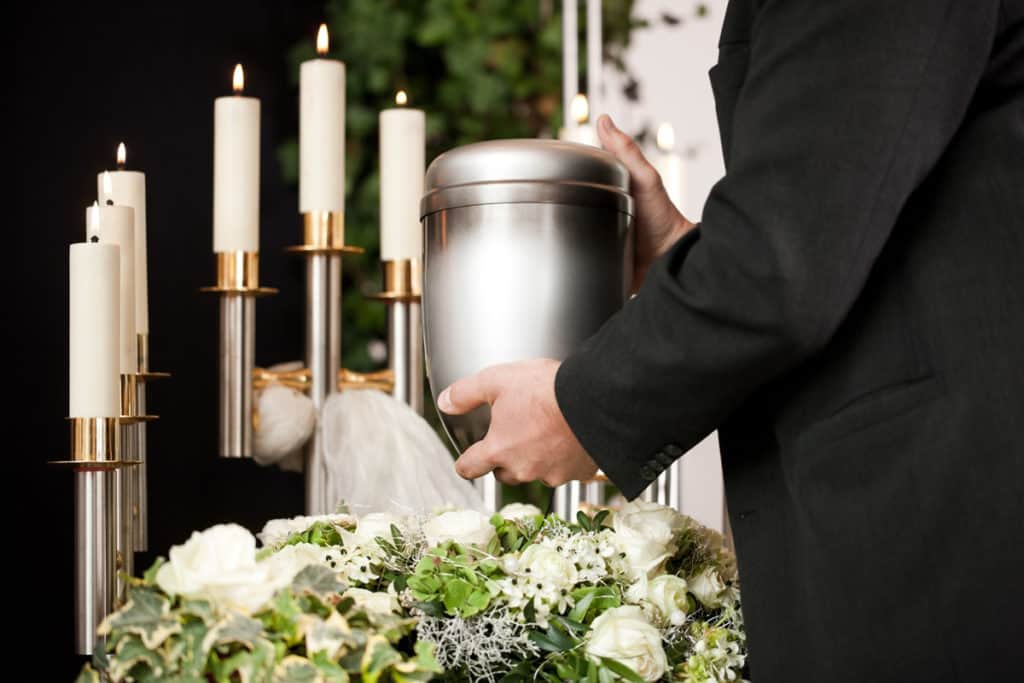This guide aims to answer some key questions about making funeral or cremation arrangements in Virginia. We provide an overview of some legal aspects of making funeral plans specific to Virginia funeral laws and what funeral or cremation costs to expect.

It will help if you already have a clear idea of the deceased’s wishes. Do you wish to arrange a traditional burial or a cremation? Does the deceased already own a burial plot or cremation niche? Establishing clear criteria before looking for a funeral home will help you in the selection process.
If you are reading this article, it is likely you either have had no prior experience with a funeral home or are researching different services. It is always recommended to consult with family, friends, and associates about their experience and recommendations. Many turn to the Internet to research funeral products and services when the cost is a factor.
Finding a funeral home or cremation provider in Virginia
There are so many funeral homes and crematories to choose from, so it can be difficult to know where to start and which funeral home can offer the best value whilst delivering a dignified service.
At US Funeral Online, we have a complete funeral home and cremation provider directory. Use our Funeral Homes section to find funeral homes in your city.

What is the cost of a funeral in Virginia?
The cost of a funeral or cremation can vary depending on where you live in Virginia. Typically, the more rural you are and the less competitive the death care industry is in your area, the higher the costs.
The National Funeral Directors Association surveyed the average funeral cost at $7,848 (2022), but this does NOT include any cemetery costs. This average can vary depending on the incremental products and services you select, such as caskets, burial plots, cremation urns, funeral flowers, and obituary notices. Adding in cemetery fees is likely to make your total cost for a traditional burial close to $10,000.
How much does a cremation cost in Virginia?
More Virginians are choosing cremation as a lower-cost alternative to traditional burial. Cremation is typically around a third of the cost of a traditional funeral. There is no need for a casket, embalming, a burial vault, or a cemetery plot. This significantly reduces funeral expenses.
A cremation can cost anywhere between $1,345 to $4,000. It largely depends on the type of cremation service you opt for.
A cremation funeral, where the deceased is present, a service is held, and the cremation is held afterward, can cost upwards of $2,000. A basic cremation, otherwise referred to as a direct cremation, can be obtained for much less.
Depending whereabouts in Virginia you require direct cremation services, it is likely to cost between $1,345 and $1,650.
Arranging a low-cost cremation in Virginia
If you are concerned about funeral costs, the DFS Memorials providers in Virginia offer low-cost cremation services and affordable burial services. All DFS Memorials providers guarantee to offer a ‘best value’ direct cremation package.
The DFS Memorial’s network of low-cost cremation providers are all licensed funeral service providers in Virginia who understand the need for simple and affordable funeral services.
Check out this Guide to Cremation Costs in Virginia to find cremation prices near you.
Choosing between Burial or Cremation in Virginia?
If the deceased did not express a preference, you may need to decide what funeral to arrange. Today, more Virginians are opting for a simple and less expensive cremation rather than a burial.
However, your family may have its own cemetery, have already pre-purchased a cemetery plot, or prefer a traditional burial service. Just be in control of what additional services may be offered to you.
A body does not have to be embalmed by law, which can be quite an additional expense, with no guarantee of preserving the body. The need for embalming is largely dictated by how soon a funeral can be arranged and whether an open-casket viewing is required.
Read our Ultimate Guide to Cremation to learn more about the cremation process, different cremation services, and other FAQs.
Understanding cremation laws in Virginia – What you need to know to arrange a cremation
The Virginia Board of Funeral Directors & Embalmers is responsible for licensing funeral homes and crematories in Virginia. They govern the practice of the cremation of human remains.
Before a cremation can go ahead, certain requirements must be met. A Cremation Authorization Form must be signed by the legal next of kin. Once the cremation has been correctly authorized, the funeral director can obtain the cremation permit.
In many states, there is a mandatory legal waiting period of 24 hours before the cremation can occur, but no such rule is in place in Virginia. That being said, it generally takes 24-48 hours to get all the legal paperwork in order and the permit to cremate authorized.
No casket is legally required for cremation, but a rigid combustible container must be used. This is generally referred to as the “cremation container” and is a reinforced cardboard box.
Know your rights – funeral laws in Virginia and how they affect funeral purchases.
All funeral homes in Virginia are required by law to provide you with a General Price List that clearly lists the prices for all their services. A funeral home should provide you with information about all the services available to you, but at no time should it pressure you into a sale.
The Federal Trade Commission’s (FTC) ‘Funeral Rule’ protects you as a funeral consumer, so ensure you equip yourself with the knowledge about your rights.
Can I conduct a home funeral in Virginia?
Yes, you can. Most people assume that they have to employ the services of a funeral director to conduct a funeral, but there is no law requiring you to do so in Virginia. You can conduct your own home funeral if you so wish.
You would need to file the death certificate and apply for the burial or cremation permit. DIY Funerals, or home funerals, are an option for those families wishing to tend to their own dead and reclaim the death care ritual.
For more information, check out our articles on DIY Funeral Care and Green Funerals in our Green Burial section.
Purchasing a casket in Virginia
Virginia is one of the remaining few states where a casket has to be purchased from the funeral home and cannot be purchased from a third-party supplier who does not have a funeral director’s license. The markup that funeral homes add to a casket can often make it the single most expensive element of funeral expenses.
Funeral homes have been known to mark up caskets at around 500%. This is why the FTC introduced the ‘Funeral Rule’ and encouraged consumers to purchase funeral products from third-party suppliers.
Unfortunately, there are a number of states where this rule does not apply, and Virginia is one of them. If you require a casket, you will need to purchase one from a licensed funeral home – but we would recommend you price-compare between licensed funeral homes. Another alternative is to purchase a ‘Hope Chest’ and use this to inter the deceased – there is no law to prevent this!
Who is responsible for paying for the funeral expenses?
There are basically two options – either you pre-plan and prepay for your funeral expenses, or surviving family will become liable for your disposition costs. You do not have to formally set up a funeral contract with a funeral service provider.
Still, you can make adequate provisions by putting funds aside in a POD account in order that the person who will arrange your funeral can access this fund immediately upon the death.
You can read more about this in ‘What is my best and safest option for putting aside money for a funeral?’
What are the laws governing Scattering Ashes in Virginia?
There are various options for the scattering of cremated remains in Virginia. If you intend to scatter ashes on private land, you need only the consent of the landowner. When it comes to scattering on uncontrolled public lands, such as rural woodland, using a common-sense approach seems the best practice.
So long as there are no environmental, health, or safety concerns, it seems appropriate to adopt the “don’t ask, don’t tell” methodology! If it is a controlled public space, such as a park, there will be regulations, and a permit may be required.
Suppose you wish to scatter ashes off the coast of Virginia. In that case, you need to ensure that you are three miles away from the coastline to conform to the Environmental Protection Agency (EPA) regulations as per the Code of Federal Regulations at 40 CFR 229.1.
Cremated remains containers must be bio-degradable if they are to be used to release ashes into the water. Flowers or wreaths are permitted as long as they are solely constructed from natural, organic materials and are fully decomposable.
You can conduct a sea burial yourself if you have a boat and observe the EPA guidelines. Otherwise, there are numerous ‘sea scattering’ charters. Both attended and unattended.
Virginia falls under Region 3 of the EPA Districts governed by the burial at sea regulations, and a written notice must be provided to the EPA Regional contact within 30 days of the burial.
The contact for Virginia is: Renee Searfoss
Burial at Sea Coordinator (searfoss.renee@epa.gov)
EPA Region 3
1650 Arch Street
Philadelphia, PA 19103
(215) 814-2137
What help is available with funeral expenses in Virginia?
There is nothing sadder and more crippling than a family who has to deal with a death when also coping with financial troubles. Unfortunately, a sudden death is not something that we can defer until our finances can cope with it.
If the deceased was a veteran or a veteran’s spouse, then some assistance may be available from the Department of Veterans Affairs [www.va.gov].
It may be possible to obtain a payment of $255 from Social Security if the deceased or the deceased’s family meets the eligibility requirements. Other than that, most Virginia counties have some rules and allowances to defray funeral expenses for those unable to pay. Although you would need to meet rigid poverty standards to qualify and have very limited control over the disposition arrangements.
You may also find that your local minister or charity/community groups may have some funds or support to assist with funeral expenses for the needy.
Although they do not always publicize it, many Mom & Pop funeral businesses will offer discounted services to families in need.
What do you do if your loved one died away from Virginia?
If your loved one died overseas, you will need a funeral professional versant in international funeral shipping, able to conduct the necessary services abroad, arrange the consulate paperwork, and shipping whilst liaising with your funeral home.
Visit our section on ‘Funeral Shipping’ to read in more detail if you require domestic or international funeral shipping services.
If your loved one has passed away in another part of Virginia or another state in the U.S., then a Mortuary Transport company can be called upon to collect the body to return it to your local funeral home. Your local funeral director should be able to coordinate this for you.
Funeral Transport can be a significant additional cost to your funeral expenses, so do check this carefully before committing to any services. The simplest and most cost-effective approach when someone has died away from home is often to arrange a direct cremation at the place of death and have the cremated remains shipped back for a memorial service.
If you do travel regularly for work, pleasure, sport, visiting family, or snow-birding, you may wish to consider our great value Travel Protection Plan. This plan costs just $450 for an individual for lifetime protection against the costly expense of returning a body home if a death occurs 75 miles (or further) from your residence in Virginia. It also provides global coverage. Domestic funeral shipping can cost from $3,000, and International repatriation can start at around $6,900.
If you do regularly travel for work, pleasure, sport, visiting family, or snow-birding, you may wish to consider our great value Travel Protection Plan. This plan costs just $450 for an individual for lifetime protection against the costly expense of returning a body home if a death occurs 75 miles (or further) from your residence. It also provides global coverage. Domestic funeral shipping can cost from $3,000, and International repatriation can start at around $6,900.
Visit our article on Travel Protection: Your Guide to Affordable Funeral Shipping, or click on the link above to enroll today.
Pre-planning a funeral, purchasing burial insurance, or pre-need funeral policies
It can greatly help matters to have pre-planned and/or pre-purchased a funeral. This can be done by simply contacting a funeral home, establishing your needs and the costs, writing out your wishes, and setting aside the appropriate monies for your next of kin.
If you purchase a Pre-need funeral plan, these are held in trust, and it is important to ensure that the policy is kept safe where the family can access it. The surviving family has often already paid funeral expenses before discovering a policy existed!
Many nursing homes and hospices in Virginia are now requiring evidence of funeral insurance or a pre-need policy before admitting patients, especially where a patient’s existing estate can be swallowed up in their medical expenses, leaving little if nothing for funeral expenses. Some funeral homes will offer special discounted care packages for those entering palliative care.
How do I obtain a certified copy of a death certificate in Virginia?
The funeral home will usually obtain the necessary death certificates for you as part of their services. They can only charge you the actual fee, which is $12 in Virginia. In Virginia, a death certificate must be filed within three days of the death and before the body is buried, cremated, or shipped (Virginia Code § 32.1-263).
You will need certified copies to formally register the death of the deceased with government institutions, banks, and insurance companies, etc. If you require additional copies, the funeral director can order these when arranging for the death certificate, or you can obtain certified copies at a later date.
Copies can be obtained from the Virginia Department of Health (VDH) either by mail, in person, by phone, or electronically. You will need to provide your ID to obtain death certificate copies.
Whole-body donation in Virginia
Donating a body to science (an anatomical gift) can be a preferred choice if you desire something completely alternative. Most universities and medical schools accept whole-body donations, and there are also several national anatomical gift programs in the United States.
Not only are you doing something qualitative for humankind, but your donation also secures a free cremation of the deceased’s remains. This is often referred to as a “no-cost cremation” by many funeral homes, as they can offer this service to the family for free by liaising with a body donation program.
Who can I contact if I have a complaint or grievance with a funeral home in Virginia?
It is a rarity that a funeral home fails in its service standards, but it does happen. If you have a grievance, you must attempt to resolve this directly with the funeral home in the first instance.
If you cannot do this, then you can contact the Virginia Funeral Directors Association, which will assist you. You can also contact the Funeral Consumers Alliance, which is an independent consumer organization that protects consumers’ rights in funeral purchases.
Related Articles:
- Understanding the FTC’s Funeral Rule and how it affects your rights when arranging a funeral
- Glossary of Funeral Terms: How to Understand the General Price List
- Understanding cremation laws and how they affect arranging a cremation
Resources:


